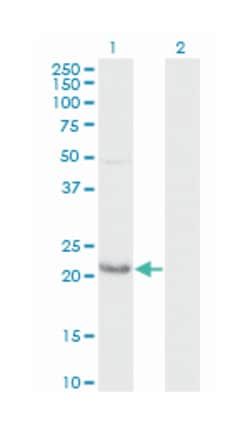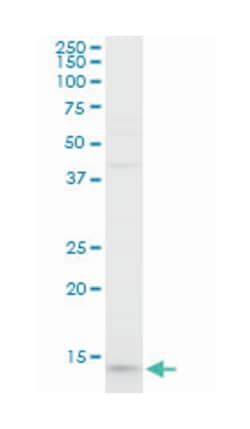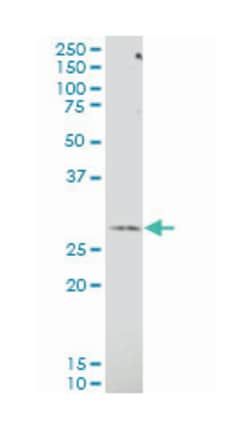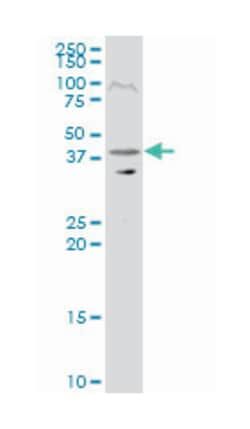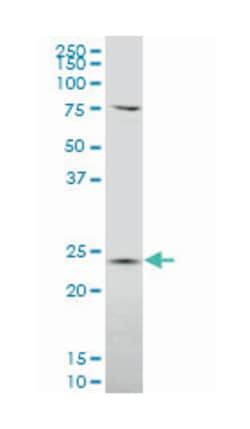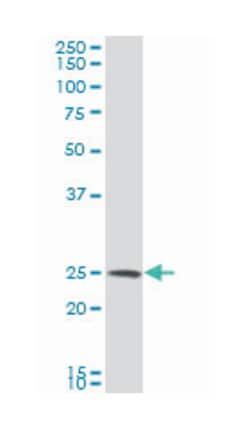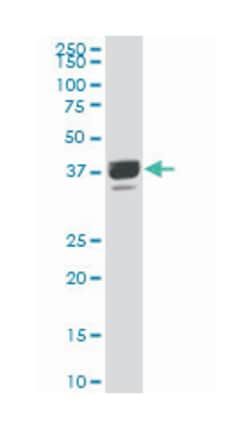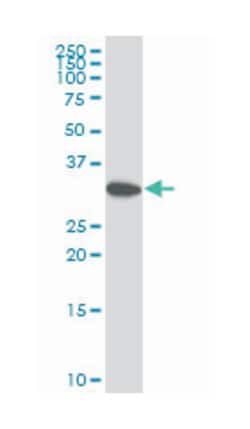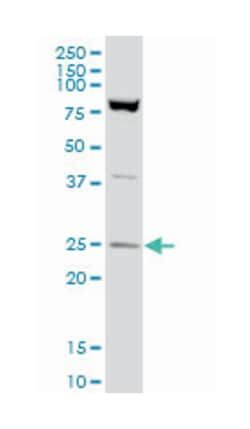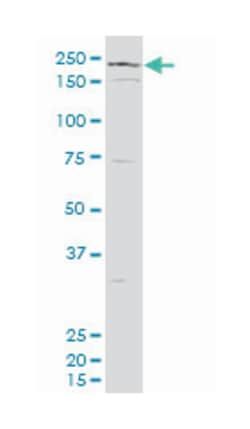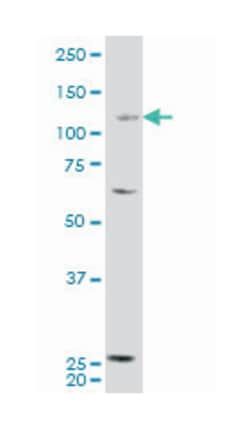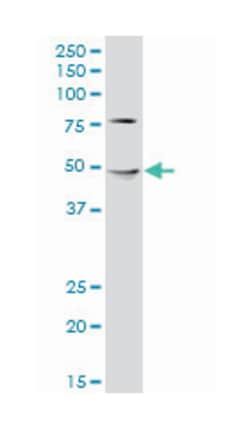89-004-277
RAN, member RAS oncogene family, Mouse, Polyclonal Antibody, Abnova™
Manufacturer: Abnova Corporation
Select a Size
| Pack Size | SKU | Availability | Price |
|---|---|---|---|
| Each of 1 | 89-004-277-Each-of-1 | In Stock | ₹ 30,794.00 |
89-004-277 - Each of 1
In Stock
Quantity
1
Base Price: ₹ 30,794.00
GST (18%): ₹ 5,542.92
Total Price: ₹ 36,336.92
Antigen
RAN, member RAS oncogene family
Classification
Polyclonal
Description
Mouse polyclonal antibody raised against a full-length recombinant RAN.
Gene
RAN
Gene Alias
ARA24/Gsp1/TC4
Host Species
Mouse
Quantity
50 μL
Research Discipline
Stem Cell Biology
Primary or Secondary
Primary
Target Species
Human
Form
Serum
Applications
ELISA, Western Blot
Conjugate
Unconjugated
Formulation
50% glycerol
Gene Accession No.
BC016654
Gene Symbols
RAN
Immunogen
RAN (AAH16654, 1 a.a. ∼ 216 a.a) full-length recombinant protein with GST tag.
Regulatory Status
RUO
Whole Molecule
Yes
Gene ID (Entrez)
5901
Content And Storage
Store at -20°C or lower. Aliquot to avoid repeated freezing and thawing.
Description
- RAN (ras-related nuclear protein) is a small GTP binding protein belonging to the RAS superfamily that is essential for the translocation of RNA and proteins through the nuclear pore complex
- The RAN protein is also involved in control of DNA synthesis and cell cycle progression
- Nuclear localization of RAN requires the presence of regulator of chromosome condensation 1 (RCC1)
- Mutations in RAN disrupt DNA synthesis
- Because of its many functions, it is likely that RAN interacts with several other proteins
- RAN regulates formation and organization of the microtubule network independently of its role in the nucleus-cytosol exchange of macromolecules
- RAN could be a key signaling molecule regulating microtubule polymerization during mitosis
- RCC1 generates a high local concentration of RAN-GTP around chromatin which, in turn, induces the local nucleation of microtubules
- RAN is an androgen receptor (AR) coactivator that binds differentially with different lengths of polyglutamine within the androgen receptor
- Polyglutamine repeat expansion in the AR is linked to Kennedy's disease (X-linked spinal and bulbar muscular atrophy)
- RAN coactivation of the AR diminishes with polyglutamine expansion within the AR, and this weak coactivation may lead to partial androgen insensitivity during the development of Kennedy's disease
- [provided by RefSeq] Sequence: MAAQGEPQVQFKLVLVGDGGTGKTTFVKRHLTGEFEKKYVATLGVEVHPLVFHTNRGPIKFNVWDTAGQEKFGGLRDGYYIQAQCAIIMFDVTSRVTYKNVPNWHRDLVRVCENIPIVLCGNKVDIKDRKVKAKSIVFHRKKNLQYYDISAKSNYNFEKPFLWLARKLIGDPNLEFVAMPALAPPEVVMDPALAAQYEHDLEVAQTTALPDEDDDL
Compare Similar Items
Show Difference
Antigen: RAN, member RAS oncogene family
Classification: Polyclonal
Description: Mouse polyclonal antibody raised against a full-length recombinant RAN.
Gene: RAN
Gene Alias: ARA24/Gsp1/TC4
Host Species: Mouse
Quantity: 50 μL
Research Discipline: Stem Cell Biology
Primary or Secondary: Primary
Target Species: Human
Form: Serum
Applications: ELISA, Western Blot
Conjugate: Unconjugated
Formulation: 50% glycerol
Gene Accession No.: BC016654
Gene Symbols: RAN
Immunogen: RAN (AAH16654, 1 a.a. ∼ 216 a.a) full-length recombinant protein with GST tag.
Regulatory Status: RUO
Whole Molecule: Yes
Gene ID (Entrez): 5901
Content And Storage: Store at -20°C or lower. Aliquot to avoid repeated freezing and thawing.
Antigen:
RAN, member RAS oncogene family
Classification:
Polyclonal
Description:
Mouse polyclonal antibody raised against a full-length recombinant RAN.
Gene:
RAN
Gene Alias:
ARA24/Gsp1/TC4
Host Species:
Mouse
Quantity:
50 μL
Research Discipline:
Stem Cell Biology
Primary or Secondary:
Primary
Target Species:
Human
Form:
Serum
Applications:
ELISA, Western Blot
Conjugate:
Unconjugated
Formulation:
50% glycerol
Gene Accession No.:
BC016654
Gene Symbols:
RAN
Immunogen:
RAN (AAH16654, 1 a.a. ∼ 216 a.a) full-length recombinant protein with GST tag.
Regulatory Status:
RUO
Whole Molecule:
Yes
Gene ID (Entrez):
5901
Content And Storage:
Store at -20°C or lower. Aliquot to avoid repeated freezing and thawing.
Antigen: jumonji, AT rich interactive domain 1A
Classification: Polyclonal
Description: Mouse polyclonal antibody raised against a partial recombinant JARID1A.
Gene: JARID1A
Gene Alias: KDM5A/RBBP2/RBP2
Host Species: Mouse
Quantity: 50 μL
Research Discipline: Transcription Regulation
Primary or Secondary: Primary
Target Species: Human
Form: Serum
Applications: ELISA, Western Blot
Conjugate: Unconjugated
Formulation: 50% glycerol
Gene Accession No.: NM_005056
Gene Symbols: JARID1A
Immunogen: JARID1A (NP_005047, 191 a.a. ∼ 290 a.a) partial recombinant protein with GST tag.
Regulatory Status: RUO
Whole Molecule: Yes
Gene ID (Entrez): 5927
Content And Storage: Store at -20°C or lower. Aliquot to avoid repeated freezing and thawing.
Antigen:
jumonji, AT rich interactive domain 1A
Classification:
Polyclonal
Description:
Mouse polyclonal antibody raised against a partial recombinant JARID1A.
Gene:
JARID1A
Gene Alias:
KDM5A/RBBP2/RBP2
Host Species:
Mouse
Quantity:
50 μL
Research Discipline:
Transcription Regulation
Primary or Secondary:
Primary
Target Species:
Human
Form:
Serum
Applications:
ELISA, Western Blot
Conjugate:
Unconjugated
Formulation:
50% glycerol
Gene Accession No.:
NM_005056
Gene Symbols:
JARID1A
Immunogen:
JARID1A (NP_005047, 191 a.a. ∼ 290 a.a) partial recombinant protein with GST tag.
Regulatory Status:
RUO
Whole Molecule:
Yes
Gene ID (Entrez):
5927
Content And Storage:
Store at -20°C or lower. Aliquot to avoid repeated freezing and thawing.
Antigen: retinol binding protein 3, interstitial
Classification: Polyclonal
Description: Mouse polyclonal antibody raised against a partial recombinant RBP3.
Gene: RBP3
Gene Alias: D10S64/D10S65/D10S66/IRBP/RBPI
Host Species: Mouse
Quantity: 50 μL
Research Discipline: __
Primary or Secondary: Primary
Target Species: Human
Form: Serum
Applications: ELISA, Western Blot
Conjugate: Unconjugated
Formulation: 50% glycerol
Gene Accession No.: NM_002900
Gene Symbols: RBP3
Immunogen: RBP3 (NP_002891, 1149 a.a. ∼ 1246 a.a) partial recombinant protein with GST tag.
Regulatory Status: RUO
Whole Molecule: Yes
Gene ID (Entrez): 5949
Content And Storage: Store at -20°C or lower. Aliquot to avoid repeated freezing and thawing.
Antigen:
retinol binding protein 3, interstitial
Classification:
Polyclonal
Description:
Mouse polyclonal antibody raised against a partial recombinant RBP3.
Gene:
RBP3
Gene Alias:
D10S64/D10S65/D10S66/IRBP/RBPI
Host Species:
Mouse
Quantity:
50 μL
Research Discipline:
__
Primary or Secondary:
Primary
Target Species:
Human
Form:
Serum
Applications:
ELISA, Western Blot
Conjugate:
Unconjugated
Formulation:
50% glycerol
Gene Accession No.:
NM_002900
Gene Symbols:
RBP3
Immunogen:
RBP3 (NP_002891, 1149 a.a. ∼ 1246 a.a) partial recombinant protein with GST tag.
Regulatory Status:
RUO
Whole Molecule:
Yes
Gene ID (Entrez):
5949
Content And Storage:
Store at -20°C or lower. Aliquot to avoid repeated freezing and thawing.
Antigen: renin binding protein
Classification: Polyclonal
Description: Mouse polyclonal antibody raised against a partial recombinant RENBP.
Gene: RENBP
Gene Alias: RBP/RNBP
Host Species: Mouse
Quantity: 50 μL
Research Discipline: __
Primary or Secondary: Primary
Target Species: Human
Form: Serum
Applications: ELISA, Western Blot
Conjugate: Unconjugated
Formulation: 50% glycerol
Gene Accession No.: NM_002910
Gene Symbols: RENBP
Immunogen: RENBP (NP_002901, 301 a.a. ∼ 400 a.a) partial recombinant protein with GST tag.
Regulatory Status: RUO
Whole Molecule: Yes
Gene ID (Entrez): 5973
Content And Storage: Store at -20°C or lower. Aliquot to avoid repeated freezing and thawing.
Antigen:
renin binding protein
Classification:
Polyclonal
Description:
Mouse polyclonal antibody raised against a partial recombinant RENBP.
Gene:
RENBP
Gene Alias:
RBP/RNBP
Host Species:
Mouse
Quantity:
50 μL
Research Discipline:
__
Primary or Secondary:
Primary
Target Species:
Human
Form:
Serum
Applications:
ELISA, Western Blot
Conjugate:
Unconjugated
Formulation:
50% glycerol
Gene Accession No.:
NM_002910
Gene Symbols:
RENBP
Immunogen:
RENBP (NP_002901, 301 a.a. ∼ 400 a.a) partial recombinant protein with GST tag.
Regulatory Status:
RUO
Whole Molecule:
Yes
Gene ID (Entrez):
5973
Content And Storage:
Store at -20°C or lower. Aliquot to avoid repeated freezing and thawing.
